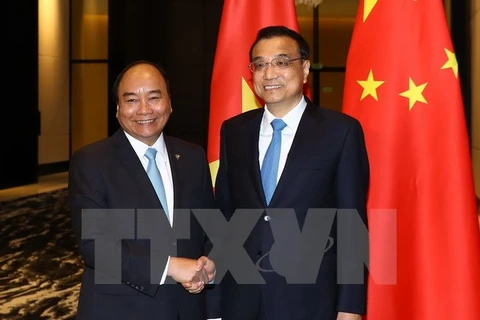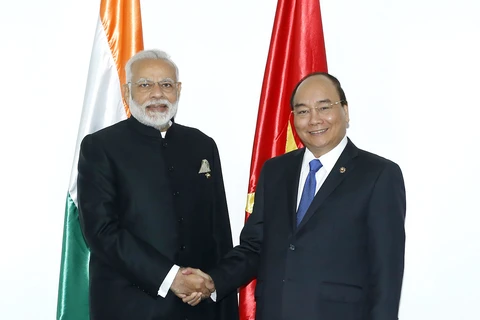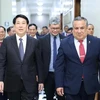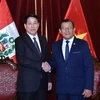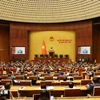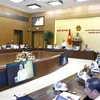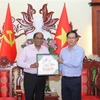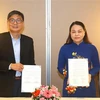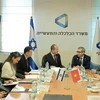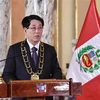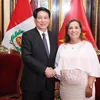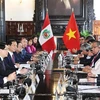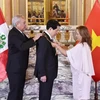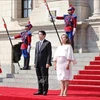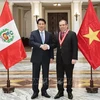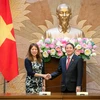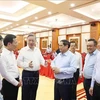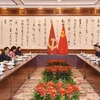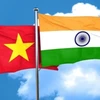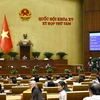Hanoi (VNA) - The Vietnam News Agency has selected the top ten world events for 2017 as follows:
1. ASEAN creates central role in region after 50 years of establishment
 Prime Minister Nguyen Xuan Phuc (fourth from left) attended 31st ASEAN Summit in Manila, the Philippines in November. (Photo: VNA)
Prime Minister Nguyen Xuan Phuc (fourth from left) attended 31st ASEAN Summit in Manila, the Philippines in November. (Photo: VNA)
2017 marks 50 years of establishment and development of the Association of Southeast Asian Nations (ASEAN). From an association with just five founding countries, ASEAN now groups ten members which have overcome various difficulties and differences to contribute to peace and prosperity in the region and the world. Of note, with the formation of the ASEAN Community in December 2015, ASEAN became the world’s sixth largest economy and the most dynamic economic community in Asia-Pacific. The association has created an important position that is rarely seen in sub-regional linkages, with mechanism connecting its member countries, as well as its member countries with other major partners.
2. 19th CPC National Congress marks new development period of China
 Chinese President Xi Jinping (centre) at the closing session of the 19th National Congress of the Communist Party of China (CPC) (Photo: VNA)
Chinese President Xi Jinping (centre) at the closing session of the 19th National Congress of the Communist Party of China (CPC) (Photo: VNA)
Taking place from October 18-24, 2017, the 19th National Congress of the Communist Party of China (CPC) rolled out thoughts, mottos, policies and strategies of socialism with Chinese characteristics for the new era, along with a strategic vision to 2050, aiming to turn China into a modern socialist power with leading influence on the world stage. The congress adopted the Resolution on the Revised Constitution of the CPC which includes Xi Jinping Thought on Socialism with Chinese Characteristics for a New Era as a new component of the Party's guide for action.
3. Democratic People’s Republic of Korea (DPRK) nuclear crisis escalates
1. ASEAN creates central role in region after 50 years of establishment
 Prime Minister Nguyen Xuan Phuc (fourth from left) attended 31st ASEAN Summit in Manila, the Philippines in November. (Photo: VNA)
Prime Minister Nguyen Xuan Phuc (fourth from left) attended 31st ASEAN Summit in Manila, the Philippines in November. (Photo: VNA) 2017 marks 50 years of establishment and development of the Association of Southeast Asian Nations (ASEAN). From an association with just five founding countries, ASEAN now groups ten members which have overcome various difficulties and differences to contribute to peace and prosperity in the region and the world. Of note, with the formation of the ASEAN Community in December 2015, ASEAN became the world’s sixth largest economy and the most dynamic economic community in Asia-Pacific. The association has created an important position that is rarely seen in sub-regional linkages, with mechanism connecting its member countries, as well as its member countries with other major partners.
2. 19th CPC National Congress marks new development period of China
 Chinese President Xi Jinping (centre) at the closing session of the 19th National Congress of the Communist Party of China (CPC) (Photo: VNA)
Chinese President Xi Jinping (centre) at the closing session of the 19th National Congress of the Communist Party of China (CPC) (Photo: VNA) Taking place from October 18-24, 2017, the 19th National Congress of the Communist Party of China (CPC) rolled out thoughts, mottos, policies and strategies of socialism with Chinese characteristics for the new era, along with a strategic vision to 2050, aiming to turn China into a modern socialist power with leading influence on the world stage. The congress adopted the Resolution on the Revised Constitution of the CPC which includes Xi Jinping Thought on Socialism with Chinese Characteristics for a New Era as a new component of the Party's guide for action.
3. Democratic People’s Republic of Korea (DPRK) nuclear crisis escalates
Tension on the Korean Peninsula continued to escalate with ballistic missile tests capable of reaching US territory in the Pacific Ocean, especially the DPRK’s sixth nuclear test on September 3, 2017. In the year, the UN Security Council adopted four sanction resolutions on the DPRK. US President Donald Trump made firm statements, even putting the country back on a so-called list of “state sponsors of terrorism.” However, the crisis has rumbled on, reflecting that sanctions and isolation measures taken by the international community had no effect and even prompted the DPRK to up the ante.
4. US withdraws from many global commitments, shapes Indo-Pacific policy
 US President Donald Trump signed an executive order on January 23 formally withdrawing the country from the 12-nation Trans-Pacific Partnership trade deal (Photo: EPA/VNA)
US President Donald Trump signed an executive order on January 23 formally withdrawing the country from the 12-nation Trans-Pacific Partnership trade deal (Photo: EPA/VNA) To implement the “America first” message of his 2016 campaign, President Donald Trump walked back decisions on a range of important economic and diplomatic policies during his first year in office, such as the US’s withdrawal from the Trans-Pacific Partnership agreement, the Paris Agreement on climate change response and the UN Organisation for Education, Science and Culture (UNESCO). The US also cut spending on US diplomacy and foreign assistance by one third, and tightened immigration policies. The new National Security Strategy announced by President Donald Trump on December 18 also reflects a unilateral policy that promotes the national interests of the US. However, the “Indo-Pacific” geo-political term used by the present US administration has demonstrated a new strategic vision towards larger connectivity.
5. Europe faces security, political uncertainties
In 2017, Europe continued to face much political and security uncertainty. Several terrorist attacks took place in the UK, France and Belgium. Separatist movements flourished in a number of countries with the most noteworthy being the illegal referendum in the Catalonia region of Spain, obstacles in negotiations of the establishment of a new government in Germany and profound contradictions within Europe during Brexit talks.
6. Recognising Jerusalem as Israeli capital: US’s dangerous step
 Palestinian people demonstrate against the US President's decision to ecognise Jerusalem as Israel’s capital(Photo: Xinhua/VNA)
Palestinian people demonstrate against the US President's decision to ecognise Jerusalem as Israel’s capital(Photo: Xinhua/VNA) US President Donald Trump’s decision on December 6, 2017 to recognise Jerusalem as Israel’s capital and move the US embassy from Tel Aviv to Jerusalem sparked a global outcry. The move was considered a dangerous step that not only threatens to destroy peace talks in the Middle East but also fuels a new wave of violence between Palestinian and Israeli people, as well as between the Arab and Jewish communities, threatening security and stability in the Middle East and the world at large.
7. World economy records fastest growth in seven years
With rosy signs among the world’s leading economies like the US, China, the Eurozone and Japan, the International Monetary Fund (IMF) upgraded the global economic growth rate from 3.6 percent in 2017 to 3.7 percent in 2018, much higher than 2016’s 3.2 percent. Global stock markets have been thriving, especially the US stock market which has continuously broken records, with the Dow Jones index crossing 24,000 points for the first time. In Japan, the Nikkei 225 also set a new 21-year high of 21,805.17 on October 24, 2017.
8. IS completely loses in Syria, Iraq
With strong intervention from Russia and international coalition forces, the fight against the Islamic State (IS) in Syria and Iraq claimed major triumphs. After several campaigns in 2017, the Russian army claimed that it had completely driven IS militants out of Syria. In Iraq, IS militants were wiped out in all important bases held by the group for more than three years. However, risks posed by IS have yet come to an end as violent extremism continues to spread and the group is using new methods to launch terrorist attacks.
9. Russia banned from competing at 2018 Winter Olympics
The International Olympic Committee (IOC) decided to ban Russia from competing at the 2018 Winter Olympics following allegations of the so-called Russian Government-sponsored doping programme, which Moscow has repeatedly denied. However, Russian athletes who can prove they are clean will be allowed to compete in the 2018 Winter Olympics under a neutral flag. According to the IOC, the decision was not influenced by political considerations. But Russian authorities have linked the decision with an “anti-Russian” campaign in the west.
10. Artificial intelligence develops strongly
 Robot Sophia at the “The Future of Everything – Sustainable Development in the Age of Rapid Technological Change” at the UN's Headquarters in New York, the US.
Robot Sophia at the “The Future of Everything – Sustainable Development in the Age of Rapid Technological Change” at the UN's Headquarters in New York, the US.(Photo: VNA)
Artificial intelligence (AI) recorded strong developments in 2017. There were various expanded projects with resources from individuals, organisations, businesses and governments and products of many sectors from transport to cutting-edge machines in health care, AI applications in distributions, retail, intelligence service, security, supervision and research. New-generation robots look, sound and think like human beings. Of note, Saudi Arabia bestowed citizenship on a “female” robot named Sophia. However, AI is posing big challenges to human beings, especially risks to global security and stability.-VNA
VNA






